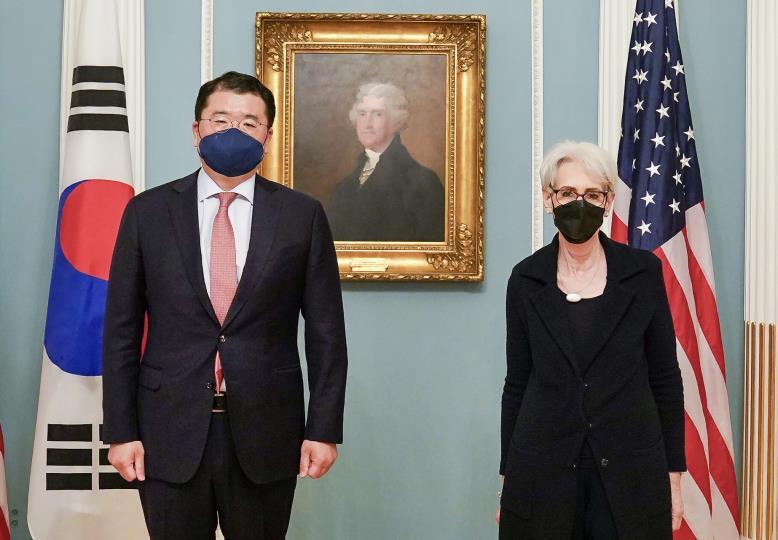 |
South Korea's First Vice Foreign Minister Choi Jong-kun (left) poses for a photo with US Deputy Secretary of State Wendy Sherman in Washington on Tuesday. (Ministry of Foreign Affairs) |
Senior diplomats of South Korea and the US discussed how to restart stalled nuclear talks with North Korea, including Seoul’s proposal to formally end the Korean War, the Foreign Ministry said Wednesday, amid concerns that the allies may be at odds over President Moon Jae-in’s proposal.
First Vice Foreign Minister Choi Jong-kun is in Washington through Friday for talks on security issues including North Korea, economic cooperation and other matters. Choi met his American counterpart, US Deputy Secretary of State Wendy Sherman, on Tuesday there for an hour and discussed issues of common interest, including COVID-19 vaccines and global supply chain disruptions, according to the ministry.
“The vice ministers assessed close communications and coordination underway at all levels on ways to make progress on the Korean peace process, including the end-of-war declaration, and agreed to continue consultations on practical measures to bring North Korea to the dialogue table,” the ministry said in a statement.
Upon arrival in Washington on Sunday, Choi said he expected a “good result” soon in the Seoul-Washington discussions on the end-of-war declaration, indicating there could be some progress toward an agreement.
But the State Department’s separate statement on the meeting did not mention the end-of-war declaration, hinting that the allies could be at odds over the issue. The statement only said the two discussed North Korea and our “shared commitment to the complete denuclearization of the Korean Peninsula.”
There have been series of high-level talks between Seoul and Washington officials in recent months, following up on President Moon’s renewed push for an end-of-war declaration -- as a means to induce Pyongyang back to talks.
The Korean War concluded not in a peace treaty, but in an armistice agreement signed by the US-led United Nations Command, China and North Korea, meaning the two Koreas are technically still at war after seven decades.
Seoul views the end-of-war declaration as a starting point for the future denuclearization process of Pyongyang. Meanwhile, Washington appears to differ, as there has been speculation that the US would not sign on to the end-of-war declaration proposal without Pyongyang’s commitment to denuclearize, or at least concrete steps toward that goal.
Hinting at possible disaccord with Seoul, US national security adviser Jake Sullivan, however, said last month that the allies “may have somewhat different perspectives on the precise sequence or timing or conditions for different steps” in regards to the end-of-war declaration.
In Washington, Choi and Sherman were set to be joined by their Japanese counterpart, Takeo Mori, for trilateral talks Wednesday.
During the Choi-Sherman meeting, the two envoys underscored that cooperation between the US, South Korea and Japan is “essential to tackling the global challenges of the 21st century, including combating COVID-19 and the climate crisis and ensuring resilient supply chains and post-pandemic economic recovery,” according to the State Department.
Choi’s meeting with Sherman came a day after US President Joe Biden and Chinese President Xi Jinping held their first virtual summit on Monday, as the two leaders seek to manage their strained ties to avert conflict.
Sullivan said the leaders pointed to North Korea as one of key areas where Beijing and Washington can cooperate.
By Ahn Sung-mi (
sahn@heraldcorp.com)








